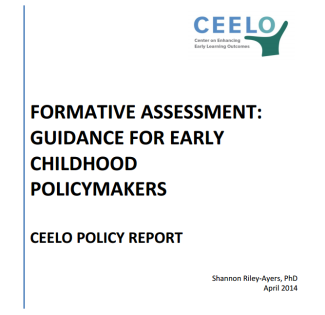
Formative Assessment
Points to Consider for Policy Makers, Teachers, and Researchers
April 16, 2014
Formative assessment is one area in early childhood education where policy is moving at lightning speed. There’s been a lot of support for the appropriateness of this approach to assessment for young learners. Many policy makers and data users have “talked the talk,” perfecting the lingo and pushing the implementation of policies for this approach. Yet there are essential questions to consider when rolling out a plan or process for a state. In the brief released by the Center on Enhancing Early Learning Outcomes (CEELO), I outline several considerations for policy makers in moving such initiatives. They’re briefly outlined below, along with considerations for teachers and researchers.
For Policy Makers
Policies around formative assessment in early childhood education will be most successful when the below “top 10” items are considered thoughtfully before implementing.
Overall Considerations for Policymakers Responsible for Formative Assessment Systems
- Does the purpose of the assessment match the intended use of the assessment? Is it appropriate for the age and background of the children who will be assessed?
- Does the assessment combine information from multiple sources/caregivers?
- Are the necessary contextual supports in place to roll out the assessment and use data effectively? (e.g., training, time, ongoing support)
- Does the assessment have a base or trajectory/continuum aligned to child developmental expectations, standards, and curricula? Does it include all key domains?
- Does the assessment have a systematic approach and acceptable reliability and validity data? Has it been used successfully with similar children?
- Are the data easily collected and interpreted to effectively inform teaching and learning?
- What technology is necessary to gather data?
- Are the data useful to teachers and other stakeholders?
- What are the policies for implementation and what is the roll-out plan for the assessment?
- Will data be gathered and maintained within FERPA and other security guidelines? Are there processes in place to inform stakeholders about how data are being gathered and held securely to allay concerns?

I encourage all stakeholders in assessment (policy makers, administrators, parents/caregivers, etc.) to exercise patience with teachers learning the science of this process and perfecting the art of implementing such an approach. Although many effective teachers across the decades have been doing this instinctively, as we make the approach more systematic, explicit, and transparent, teachers may have a steep learning curve. However, with the considerations above as a part of the decision-making process, teachers will find it easier to be successful. This policy report provides a guide and framework to early childhood policymakers considering formative assessment. This guide provides a practical roadmap for decision-makers by offering several key questions to consider in the process of selecting, supporting, and using data to inform and improve instruction.
For Teachers
The intent of formative assessment is to implement the process of using data (observation or other) to inform individualized instruction. The link between this type of embedded assessment and instruction should be seamless. Teachers work with great effort at this on several different levels. Effective early childhood teachers:
- use immediate feedback from children in the moment and adjust the interaction based on this feedback.
- collect evidence over time to evaluate the child’s growth and to plan long-term learning goals. These goals are reviewed periodically and adjusted based on new evidence.
- look at aggregate data across their classrooms. They examine the data for trends and self-reflect on their teaching practices based on what the data are showing.
For Researchers
We must move forward by setting a strong research agenda on the effects of formative assessment in early childhood classrooms–and not allow policy to outpace research. We need further research around using formative assessment processes to collect, analyze, and use the data to improve teaching and learning in the early childhood classroom. This must first include randomized trials of formative assessment, to examine the impact on classroom quality and child outcomes. The field needs a clear understanding of how teachers are trained and supported in collecting and using the data, and just what supports are needed for success. This should be coupled with a qualitative understanding of how teachers are using data in their classrooms. Finally, an understanding of who is using the data, in what capacity–and how it fits within the larger assessment system–should be components of any examination of formative assessment.
– Shannon Riley-Ayers, Assistant Research Professor, NIEER and CEELO
About NIEER
The National Institute for Early Education Research (NIEER) at the Graduate School of Education, Rutgers University, New Brunswick, NJ, conducts and disseminates independent research and analysis to inform early childhood education policy.
